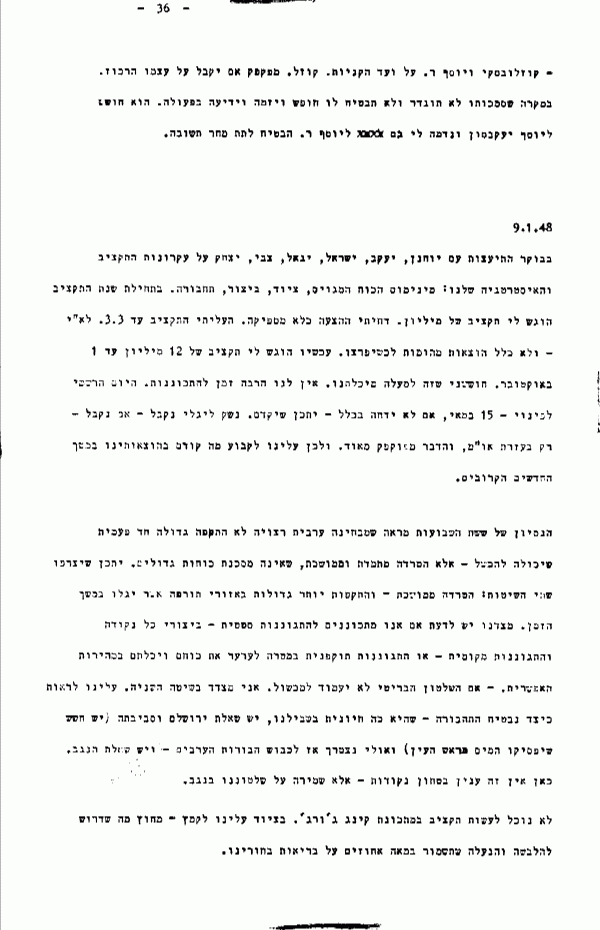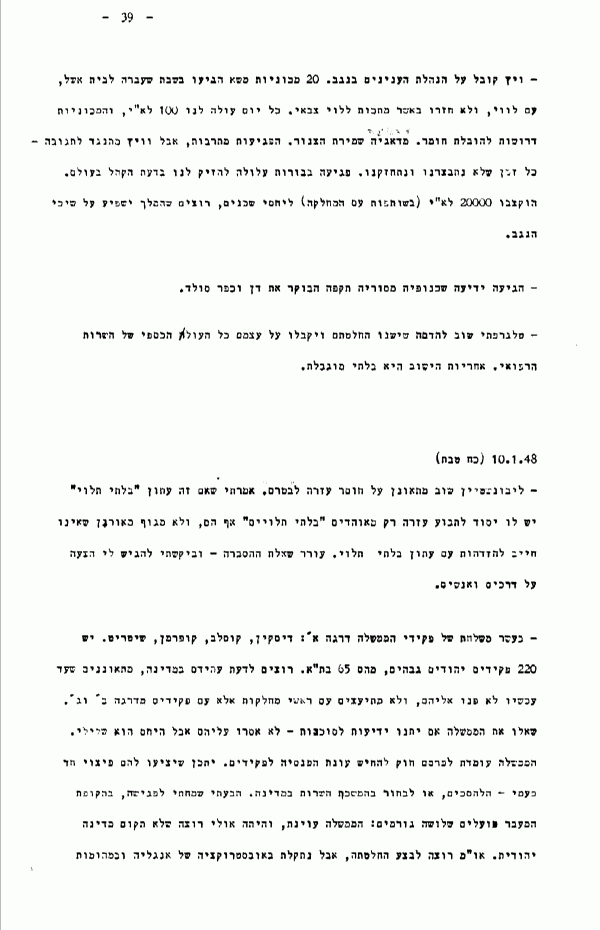1
of
Places:
Jerusalem
Rosh Ha'Ayin
Tira
Dead Sea
Acre
Yazur
Jaffa
Dan
United States
The use of the photograph is subject to the Copyright Law, 2007
09.01.1948
224817
[Friday,] January 9, 1948 In the morning a consultation with Yohanan [Ratner], Ya’akov [Dori], Yisrael [Galili], Yigael [Yadin], Zvi [Ayalon], Yitzhak [Sadeh] – regarding the principles of our budget and strategy: a minimum enlisted force, equipment, fortification, transport. At the start of the fiscal year I was presented with a budget of a million. I rejected the proposal as insufficient. I increased the budget to P£ 3.3 million – not including expenses for riots when and if they break out. Now I was presented with a budget of 12 million through October 1. I fear this is beyond our capacity. We don’t have much time to prepare. The official date for withdrawal – May 15. If it isn’t rejected altogether – it might be moved forward. We will receive legal weapons – if we receive them – only with UN assistance, and this is very doubtful. Therefore we must determine what takes priority in expenditures over the coming months. The experience of six weeks indicates that in terms of the Arabs what [they] want is not a single, large-scale attack that might fail – but continuous, prolonged harassment that doesn’t put large forces at risk. The two methods might be combined – prolonged harassment, and larger attacks in areas of vulnerability that will become apparent over time. For our part we need to know if we’re preparing for static defense – fortification of every settlement and local defense – or aggressive defense aimed at undermining [the Arabs’] strength and capability as quickly as possible – if the British government doesn’t present an obstacle. I prefer the second approach. We need to see how we’ll safeguard transport – which is so vital for us. There’s the question of Jerusalem and its surroundings (there’s concern that the water in Rosh Ha’Ayin [which is pumped by pipeline to Jerusalem] will be interrupted and we might need to capture the Arab wells in the city). And there’s the question of the Negev. Here it’s not a matter of defending settlements – but of maintaining our control in the Negev. We cannot produce a budget in the format of King George [that is, generous, like the British army]. We must scrimp on equipment – aside from what’s necessary for clothing and footwear, to protect our boys’ health 100%. Yohanan [Ratner] thinks we need a plan for counter-harassment, and economic warfare. Need to develop the use of armored vehicles (– [Ben-Gurion:] and if the Arabs use [anti-tank] mines?) Also need to make cheap fortifications – the gist of which is labor (digging). Yitzhak [Sadeh] thinks that fortifications actually facilitate attacks on our part, as they free up men from the locale. We cannot lose settlements because we don’t have room for retreat. Fortification – this means barbed wire and digging, and the conscripts will dig. Our territory falls into three categories in terms of defense: the north – from Metulla to Tirat Zvi – is surrounded [by Arabs] on all sides and we are in the minority. The central section – from Acre to Be’er Tuvia – has a posterior on one side – the sea, and a Jewish majority. The third section is the Negev, up to Eilat and the Dead Sea: similar to the north, [and] our number is even smaller. In the center we must ensure complete control, and [as to] disruptive settlements (Tira, Salameh, Yazur) – [we’ll] conquer them. We’ll seal off Jaffa. The difficulty is at the two ends ([Ben-Gurion:] and Jerusalem?). We’ll need two types of armored vehicles – for transport, and for attack (with a turret). Five armored vehicles constitute a force in the Galilee. This is even more important in the Negev. A unit of 200 men in armored vehicles has the same force as a unit of 800 without armored vehicles. There’s also need for psychological warfare and educating [preparing] the Yishuv for suffering. Zvi Lashchiner [Ayalon]: The budget depends on the size of the human force – and the scale of wages. The equipment can be reduced somewhat, and the budget can be reduced by acquiring movable items at no cost (beds, mattresses, and the like). Yigael [Yadin]: Need hasbara for commanders as well. They don’t know that until now we had the upper hand – but war means suffering. A force of 20,000 is a minimum and a maximum. 7 battalions are needed in the north, in the center 3,000 men are needed, from Tel Aviv to the Negev 4,000, in Jerusalem and surroundings 3,000. ([Ben-Gurion:] and the Negev?). This requires adding an enlisted static force of 4,000 men. Right now the garrison force is taking up more than 3,000 conscripts. 20,000 is also the maximum in terms of the possibility of conscription, because we won’t be able to conscript [the heads of] complex families [families with many children]. It’s not necessary to have the entire budget immediately. If we acquire weapons and we don’t have trained men, the weapons are useless. It’s imperative that the number of men be double that of weapons. We must disable Arab transport and the economy, and harass them in the village in the city and thus lower their morale. Need to suspend Palmach workdays and devote them only to training. Yisrael [Galili] thinks that equipment can be brought by airplanes, but men train slowly. The number of men assigned to the protection of Tel Aviv and Jerusalem is inadequate. Our line of defense is thin. We aren’t able to destroy places – only to disrupt and threaten. We have no retreat – and therefore men are needed to defend every settlement and to defend the Yishuv. The fortification of places is essential. Our hands are tied to a large extent – because we mustn’t provoke the government forces. We cannot give the government a pretext to attack the Haganah. Counter-attacks need to be close in time and place. Our patrols in villages have constrained the Arab forces – because fear fell upon them. It’s necessary to be in touch with the newspapers. Need a public relations department in the Staff. Yohanan [Ratner]: Does not believe in “arming the people” [a militia approach] – our weaponry needs to be more sophisticated than that of the Arabs, same with the medical service. Our strength depends on good training. We’ll have to maintain trained reserves – for the sake of surprise at a decisive moment. Fritz [Shalom Eshet]: Need to confiscate the equipment we need [that exists] in the Yishuv. Also need to confiscate food supplies. We should establish the prices. Before March and April – not to deliver a decisive blow, but instead to train our force and build it up and equip it properly. We’ll deliver a strong blow – when there’s no third side. The settlements themselves need to create fortifications – we should only supply barbed wire and sacks. Ya’akov [Dori] doubts it’s possible to find a trick that will reduce the budget from twelve to six million. We won’t make “deluxe” fortifications – lighting isn’t necessary. We need an engineering service – because bridges will certainly be destroyed. The problem isn’t cutting the budget – but finding the means. Need to enlist Solel Boneh. Need to provide 40 vehicles for each unit (? [– Ben-Gurion]). I summarized: The basis for our calculations – a force of 20,000; reduce wages; in support of families we’ll reduce tuition, rent, taxes; enhance our mobility through (vehicles (armor); ensure contact via airplanes and by sea with the Negev and the north; as a means of defense use armoring, excavations [trenches], barbed-wire fences; in terms of personal equipment we won’t scrimp on preserving health, but we’ll refrain from superfluous comfort. Ya’akov [Dori] will present a verified budget over the next few days. – [Yosef] Weitz [head of the Negev Committee], complains about the management of affairs in the Negev. 20 trucks arrived in Bet Eshel last Saturday with an escort and haven’t returned, because they’re waiting for a military escort. Each day costs us P£ 100, and the vehicles are needed for the transport of material. Protection of the pipeline is a cause for concern: attacks are increasing, but Weitz is against a response – so long as we haven’t fortified and reinforced ourselves. Attacking [water] wells could harm us in terms of global public opinion. P£ 20,000 was budgeted (in partnership with the Neighbor Relations Department [in the Jewish Agency’s Arab Affairs Department]). They want the king [Abdallah] to persuade the sheikhs in the Negev. – A notice arrived that a gang from Syria attacked Dan and Kefar Szold this morning. – I telegraphed Hadassah [in the United States] again [saying they should] reverse their decision and accept the financial burden of the Medical Service [for combatants]. The Yishuv has never-ending responsibilities.












